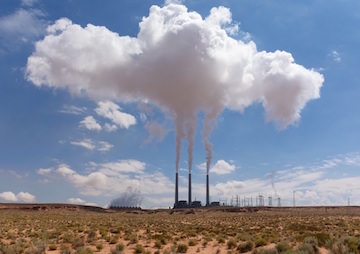Study Finds the Recession — Not a Decline in Coal Use — Cut U.S. Emissions
Researchers say it was the economy, rather than the replacement of coal by natural gas, that drove the recent drop in U.S. emissions of the main greenhouse gas. A coal-fired power plant on a Navajo reservation in Arizona. (Myrabella via Wikimedia Commons)
A coal-fired power plant on a Navajo reservation in Arizona. (Myrabella via Wikimedia Commons)
By Alex Kirby, Climate News NetworkThis Creative Commons-licensed piece first appeared at Climate News Network.
LONDON — Between 2007 and 2013 emissions of carbon dioxide from fossil fuels burnt in the US fell significantly — by about 11% — and many analysts credited this to a change from coal to natural gas in electricity production.
But new research says it was, in fact, the economic recession that explains most of the decline, and more extensive use of natural gas may not do much to slow global warming.
“Natural gas emits half as much CO2 as coal when used to make electricity,” says research professor Laixiang Sun, of the Austria-based International Institute for Applied Systems Analysis (IIASA), who conducted the study with colleagues from the University of Maryland, US.
Release of methane
But that is only part of the story, he says in a paper published in the journal Nature Communications. “This calculation fails to take into account the release of methane from natural gas wells and pipelines, which also contributes to climate change.”
Methane is 34 times more potent a greenhouse gas than CO2 over a century, but 84 times more over just 20 years.
In the US, coal-powered electricity fell from 50% to 37% of the generation mix between 2007 and 2012, with most of it replaced by natural gas — in large part, due to fracking and underground mapping technologies.
“If we don’t understand the factors that led to this emissions reduction, we won’t know how to effectively reduce emissions in the future”
The researchers say that because this shift occurred at the same time as the reduction in emissions, many commentators linked the two, mistaking temporal co-incidence for causality.
Apart from the state of the economy, they say, there were several other factors involved: population growth, for example, and energy efficiency, which both also affect total emissions.
“If we don’t understand the factors that led to this emissions reduction, we won’t know how to effectively reduce emissions in the future,” says Klaus Hubacek, an ecological economist at the University of Maryland.
So the researchers used a method known as structural decomposition analysis to tease apart the various contributions of different factors related to energy use and CO2 emissions.
This enabled them to determine the relative influence of changes in population, amount and patterns of consumption, production structure, and changes in fuel mix on total emissions of greenhouse gases.
They found that from 1997 to 2007, a period of rising emissions, 71% of the increase was due to increasing US consumption of goods and services, with the remainder due to population growth.
Mix of factors
But from 2007 to 2009, when emissions declined the most, the study finds that 83% of the decrease was due to economic factors, including consumption and production changes, and just 17% of the decline related to changes in the fuel mix. After 2009, emissions declined by only about 1%, and this was due to a mix of all three factors.
Knowing the relative influence of such factors on emissions is important for devising effective policies for future climate mitigation, the researchers say.
In particular, they say their findings may indicate that further increases in the use of natural gas may not have major benefits for the climate.
Natural gas can replace coal, but research also shows that, if it is cheap and abundant, it can limit the growth of carbon-neutral renewable energy sources.
Prof Sun says: “Sustaining economic growth while also drastically reducing emissions to the levels targeted by the Obama Administration will depend upon large additional decreases in the energy intensity of the US economy, as well as radical decarbonisation of the energy sector.”
Your support matters…Independent journalism is under threat and overshadowed by heavily funded mainstream media.
You can help level the playing field. Become a member.
Your tax-deductible contribution keeps us digging beneath the headlines to give you thought-provoking, investigative reporting and analysis that unearths what's really happening- without compromise.
Give today to support our courageous, independent journalists.






You need to be a supporter to comment.
There are currently no responses to this article.
Be the first to respond.